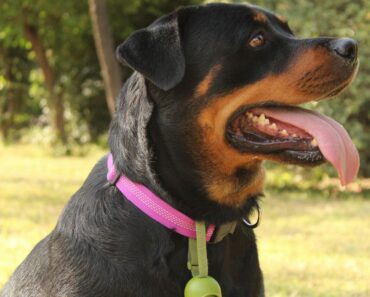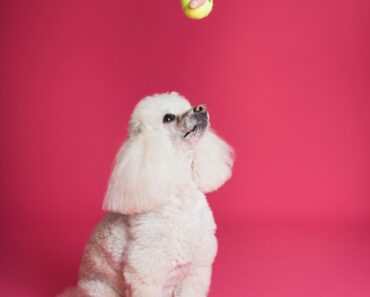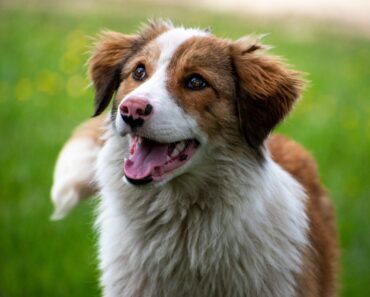Golden Retrievers are known for being friendly, gentle, and smart. They are one of the most popular dogs in the U.S. Owners love them for their loving nature. But, taking care of and training a Golden Retriever needs a good understanding of their needs and behaviors. This guide will help you care for your Golden Retriever and build a strong bond with them.
A golden retriever running through a field of tall grass with the sun setting behind them. The dog is looking back towards the camera with their tongue out, a happy expression on their face.
Key Takeaways
- Golden Retrievers are intelligent, eager-to-please dogs that thrive on positive reinforcement training.
- Proper socialization and obedience training are crucial for developing well-behaved Golden Retrievers.
- Grooming, exercise, and a high-quality diet are essential for maintaining the health and well-being of Golden Retrievers.
- Understanding common health concerns and providing preventative care can help Golden Retrievers live long, healthy lives.
- Introducing Golden Retrievers to new environments and experiences in a positive way is important for their development.
Understanding the Golden Retriever Breed
The golden retriever is a beloved breed with a rich history and a remarkable temperament. These intelligent, loyal, and affectionate dogs have captured the hearts of people around the world. They are one of the most popular family companions.
History and Origin
In the 19th century, Scotland developed the golden retriever breed. Their ancestors were a mix of various retrievers, including the flat-coated retriever, the Newfoundland, and the tweed water spaniel. The aim was to create a dog that was great at hunting and loved water, but also gentle and friendly.
The first golden retrievers were recognized by the Kennel Club in the UK in 1903. Soon, they became popular in the UK and the US. Today, they are one of the most recognizable and beloved dog breeds. They are known for their friendly nature and easygoing personality.
Temperament and Personality Traits
Golden retrievers are seen as one of the most affectionate and eager-to-please breeds. They have a warm, friendly, and gentle temperament, making them great with families. These dogs love being around people and are highly intelligent, which makes them easy to train.
- Friendly and outgoing personality
- Gentle and patient with children
- Highly intelligent and trainable
- Love of water and outdoor activities
- Loyal and devoted to their owners
Golden retrievers also love to play and exercise. They are energetic and need regular physical activity to be happy and healthy. Their gentle nature and desire to please make them great therapy and service dogs, as well as excellent hunting and sporting companions.
“The golden retriever is a breed that is universally beloved for its friendly, affectionate, and loyal nature. These dogs have a special way of capturing the hearts of their owners and becoming indispensable members of the family.”
| Trait | Description |
|---|---|
| Temperament | Friendly, gentle, and eager to please |
| Personality | Outgoing, loyal, and affectionate |
| Activity Level | High, requiring regular exercise and playtime |
| Intelligence | Highly intelligent, making them easy to train |
Essential Supplies for Golden Retriever Ownership
Welcoming a golden retriever into your home is exciting but requires preparation. You’ll need essential supplies for golden retrievers to make sure your pet is comfortable and happy. These include food and water bowls, grooming tools, and toys. These must-have items for golden retrievers ensure you’re giving the best care.
A high-quality golden retriever food and water bowl is key. They should be strong, not slip, and the right size for your pup’s age and breed. Also, a good leash, collar, and ID tag are vital for safe walks and outings.
- Food and water bowls
- Leash, collar, and ID tag
- Crate or dog bed
- Grooming supplies (brush, shampoo, nail clippers)
- Chew toys and interactive puzzles
- Training treats and clicker
- Poop bags and waste disposal supplies
A crate or dog bed gives your golden retriever a cozy spot to rest. Grooming tools like a brush, shampoo, and nail clippers keep their coat shiny and skin healthy.
| Essential Supply | Purpose |
|---|---|
| Food and water bowls | Provide high-quality nutrition and hydration |
| Leash, collar, and ID tag | Ensure safe and secure outdoor experiences |
| Crate or dog bed | Offer a comfortable and secure space for rest and relaxation |
| Grooming supplies | Maintain a healthy, beautiful golden coat |
| Chew toys and puzzles | Provide mental stimulation and prevent boredom |
| Training treats and clicker | Facilitate effective and positive training sessions |
| Poop bags and waste disposal | Ensure responsible and eco-friendly pet ownership |
Getting these golden retriever supplies, puppy supplies for golden retrievers, and must-have items for golden retrievers sets you up for success. You’ll be giving your furry friend the care and comfort they deserve.https://www.youtube.com/embed/5tMUDqIZl8g
Proper Nutrition and Diet for Golden Retrievers
Feeding your Golden Retriever the right food is key to their health and happiness. These dogs need a diet that supports their growth, keeps their coat shiny, and keeps them energetic. It’s important to meet their dietary needs for their overall well-being.
High-Quality Dog Food
Choosing the best dog food for your Golden Retriever is crucial. Look for food rich in protein, healthy fats, and vitamins and minerals. Stay away from low-quality foods with fillers and artificial additives that can be bad for your pet.
Portion Control and Feeding Schedules
Golden Retrievers can easily gain weight, so watch their food portions and feeding times. Adult Golden Retrievers should eat two to three times a day. The amount they need varies based on their activity level and size, usually between 2 to 3 1/2 cups of quality food daily.
| Golden Retriever Age | Recommended Daily Food Intake |
|---|---|
| Puppy (up to 1 year) | 3-4 cups of high-quality puppy food, split into 3-4 meals |
| Adult (1-7 years) | 2-3 1/2 cups of high-quality adult dog food, split into 2-3 meals |
| Senior (7+ years) | 2-3 cups of high-quality senior dog food, split into 2-3 meals |
Every Golden Retriever is different, so it’s key to work with your vet. They can help find the best golden retriever diet and golden retriever feeding schedule for your dog.
“Proper nutrition is the foundation of a healthy and happy Golden Retriever. By feeding your dog a high-quality, balanced diet, you’re setting them up for a lifetime of wellbeing.”
Golden Retriever Training
Training your golden retriever is key to making them a good and happy pet. It starts with the basics and goes on to improve their obedience. This process is vital for being a responsible owner.
Puppy Training Basics
Training your golden retriever puppy early is important. They love to learn and do well with positive methods like clicker training. Teach them basic commands like sit, stay, come, and heel first.
It’s also important to socialize your puppy. This means letting them meet new people, animals, and places in a good way. Puppy socialization classes are great for this.
Obedience Training Techniques
As your golden retriever gets older, keep up with basic commands and add more advanced ones. Positive reinforcement training is best. It rewards good behavior and gently corrects the bad ones.
Learning skills like heel, stay, and retrieve makes your golden retriever better behaved. Make training fun by adding games and interactive sessions. This keeps you and your dog happy.
“The key to successful golden retriever training is patience, consistency, and a positive approach. With the right techniques, you can shape your pup into a loyal, obedient, and well-behaved companion.”
Grooming and Maintaining a Healthy Coat
Keeping a golden retriever’s coat looking great is key to their care. Proper golden retriever grooming keeps their look and prevents skin and coat problems. A balanced golden retriever brushing and golden retriever bathing routine is essential for a healthy coat.
Brushing and Bathing Routines
Golden retrievers need regular brushing to stay in top shape. Brush your pup 2-3 times a week with a high-quality brush or undercoat rake. This golden retriever coat care routine reduces shedding and keeps their coat looking great.
Golden retrievers should get a bath every 4-6 weeks, based on their activity and lifestyle. Use a gentle, pH-balanced dog shampoo and lukewarm water for a thorough cleanse. Make sure to rinse all soap out to avoid skin irritation. Proper golden retriever grooming through bathing keeps their coat healthy and shiny.
| Grooming Task | Frequency |
|---|---|
| Brushing | 2-3 times per week |
| Bathing | Every 4-6 weeks |
Following a consistent golden retriever brushing and golden retriever bathing routine keeps your furry friend’s coat healthy, shiny, and free of tangles.
Exercise and Mental Stimulation Needs
Golden retrievers are full of energy and need lots of physical activity and mental challenges. They are smart dogs that need to stay busy. Regular exercise helps them stay happy and healthy, and it stops bad behaviors from happening.
To keep a golden retriever happy, they should get at least 60 minutes of exercise every day. You can mix up their activities with walks, playing fetch, swimming, or agility training. The amount and type of exercise should match the dog’s age and energy level. Puppies need shorter, more frequent workouts, while adult golden retrievers can do longer activities.
Golden retrievers also need mental challenges. They love doing things that make them think, like obedience training, puzzle toys, and nose work. These activities keep them from getting bored and use their brains in a good way.
- Engage your golden retriever in challenging obedience training exercises to hone their responsiveness and attentiveness.
- Provide interactive puzzle toys that encourage them to use their problem-solving skills to access treats or rewards.
- Introduce nose work activities, where your golden retriever can use their exceptional sense of smell to search for hidden items or scents.
By balancing physical and mental activities, you can keep your golden retriever happy and healthy. Tailoring their activities to their needs helps them live a better life and stops bad behaviors.
A golden retriever running happily through an open field, with bright green grass and tall blue skies in the background. The dog has a big smile on its face and its ears are flapping in the wind. It’s carrying a tennis ball in its mouth, which it just caught mid-air after chasing it down. The dog’s muscles are toned, showing off their strength and agility. The sky is scattered with white fluffy clouds, adding to the feeling of freedom and joy.
“A tired dog is a well-behaved dog. Providing ample exercise and mental stimulation is key to a golden retriever’s happiness and overall well-being.”
Socializing and Introducing Golden Retrievers to New Environments
Socializing your Golden Retriever is key for their happiness and growth. It’s important for both puppies and adult dogs. It means introducing them to new people, animals, and places in a safe way. This helps them become confident and friendly friends.
Puppy Socialization
The key time for golden retriever puppies to learn about the world is from 3 to 12 weeks old. During this period, they need to have positive experiences. This includes:
- Meeting different people, like kids, seniors, and those from various backgrounds
- Meeting other pets, such as cats and dogs, that are friendly
- Getting used to different places, like busy streets, crowded parks, and new spots
- Getting rewards and praise for being calm and friendly
By socializing your golden retriever puppy early, they’ll grow up to be confident and friendly. They’ll be okay in many different situations.
Adult Dog Socialization
Don’t stop socializing your Golden Retriever when they’re an adult. They still need to meet new people, animals, and places. Here’s how to introduce them:
- Start slow and in a safe place, letting your dog meet new people or pets when they’re ready
- Give them treats or praise when they act calm and friendly
- Avoid pushing them to interact, as it could make them scared or aggressive
- Be patient and keep trying, as it might take time for them to feel okay in new places
By focusing on golden retriever socialization at all stages, you make sure your dog is well-adjusted and easy to be around.
Common Health Concerns and Preventative Care
Golden retrievers are loved for their energy and companionship. They need careful care to stay healthy. Owners should know about common health problems and take steps to prevent them.
Hip and elbow dysplasia is a big worry for golden retrievers. It’s a genetic issue that can cause a lot of pain. Regular veterinary check-ups help catch and treat it early.
Golden retrievers are also at risk for types of cancer like lymphoma and hemangiosarcoma. Catching these early through regular check-ups and quick action on any strange lumps can make a big difference.
Eye health is another big concern. Issues like cataracts and progressive retinal atrophy are common. Taking them to the veterinary ophthalmology regularly can help spot and fix problems early.
| Common Health Concern | Preventative Measures |
|---|---|
| Hip and Elbow Dysplasia | Regular veterinary check-ups and screenings |
| Cancer | Routine examinations, prompt treatment of abnormalities |
| Eye Conditions (Cataracts, Progressive Retinal Atrophy) | Regular veterinary ophthalmology visits |
Being proactive with preventative care and having a good relationship with a veterinarian helps golden retrievers live long, healthy lives. This way, they can stay happy and by our side.
A golden retriever lying on a grassy field, with a shiny coat and bright eyes. In the background, a veterinarian performing a routine check-up, including checking the dog’s teeth, ears, and paws. A chart on a clipboard shows the dog’s vaccination history and preventative care measures taken by the owner. In the foreground, a bowl of fresh water and a bag of high-quality dog food. The image conveys the importance of regular check-ups and preventative care in ensuring a happy and healthy golden retriever.
Conclusion
This guide has covered the key aspects of caring for and training Golden Retrievers, a beloved dog breed. We’ve looked at the breed’s history, temperament, and what you need for their care. It’s all about making sure your Golden Retriever is happy, healthy, and well-adjusted.
For golden retriever care, a balanced diet, regular exercise, and grooming are essential. Also, golden retriever training is important from puppyhood to adulthood. It helps them become well-behaved and social. By focusing on these areas, you’ll have a great bond with your dog.
Golden Retrievers are known for their loyalty, affection, and smarts. With the advice from this guide, your Golden Retriever will flourish. They’ll become a valued part of your family for many years.
FAQ
What are the essential supplies needed for a Golden Retriever?
For a Golden Retriever, you’ll need high-quality dog food, water and food bowls, leashes, and collars. Don’t forget toys, grooming tools like brushes and nail clippers, and a crate or bedding. It’s also good to have training treats and a spot for exercise and play.
How often should a Golden Retriever be groomed?
Golden Retrievers need grooming 2-3 times a week. Brush their thick coat to remove loose hair and prevent mats. Bath them every 4-6 weeks to keep their coat healthy and prevent skin issues.
What are the best training techniques for a Golden Retriever?
Use positive reinforcement for training Golden Retrievers. This means clicker training and rewarding good behavior with treats or praise. It helps build a strong bond and shapes their behavior in a kind way.
How much exercise does a Golden Retriever need?
Golden Retrievers need lots of exercise and mental stimulation. Aim for 30-60 minutes of activity daily. This can be walks, playtime, or interactive games.
What are some common health concerns for Golden Retrievers?
Golden Retrievers often face health issues like hip and elbow dysplasia, cancer, eye problems, and skin conditions. Regular vet visits, a healthy diet, and proper exercise and grooming can help prevent and manage these problems.





